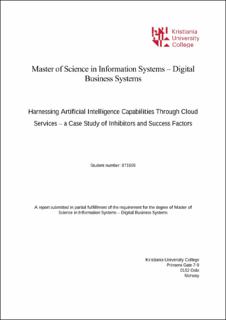Harnessing Artificial Intelligence Capabilities Through Cloud Services – a Case Study of Inhibitors and Success Factors
Master thesis
Permanent lenke
https://hdl.handle.net/11250/3109901Utgivelsesdato
2022Metadata
Vis full innførselSamlinger
Sammendrag
Industry and research have recognized the need to adopt and utilize artificial intelligence (AI) to automate and streamline business processes to gain competitive edges. However, developing and running AI algorithms requires a complex IT infrastructure, significant computing power, and sufficient IT expertise, making it unattainable for many organizations. Organizations attempting to build AI solutions in-house often opt to establish an AI center of excellence, accumulating huge costs and extremely long time to value. Fortunately, this deterrence is eliminated by the availability of AI delivered through cloud computing services. The cloud deployment models, Infrastructure as a Service, Platform as a Service, and Software as a Service provide various AI services. IaaS delivers virtualized computing resources over the internet and enables the raw computational power and specialized hardware for building and training AI algorithms. PaaS provides development tools and running environments that assist data scientists and developers in implementing code to bring out AI capabilities. Finally, SaaS offers off-the-shelf AI tools and pre-trained models provided to customers on a commercial basis. Due to the lack of customizability and control of pre-built AI solutions, this empirical investigation focuses merely on IaaS and PaaS-related AI services. The rationale is associated with the complexity of developing, managing and maintaining customized cloud infrastructures and AI solutions that meet a business's actual needs.
By applying the Diffusion of Innovation (DOI) theory and the Critical Success Factor (CSF) method, this research explores and identifies the drivers and inhibitors for AI services adoption and critical success factors for harnessing AI capabilities through cloud services.Based on a comprehensive review of the existing literature and a series of nine systematic interviews, this study reveals ten factors that drive- and 17 factors that inhibit the adoption of AI developer tools and infrastructure services. To further aid practitioners and researchers in mitigating the challenges of harnessing AI capabilities, this study identifies four affinity groups of success factors: 1) organizational factors, 2) cloud management factors, 3) technical factors, and 4) the technology commercialization process. Within these categories, nine sub-affinity groups and 20 sets of CSFs are presented.

